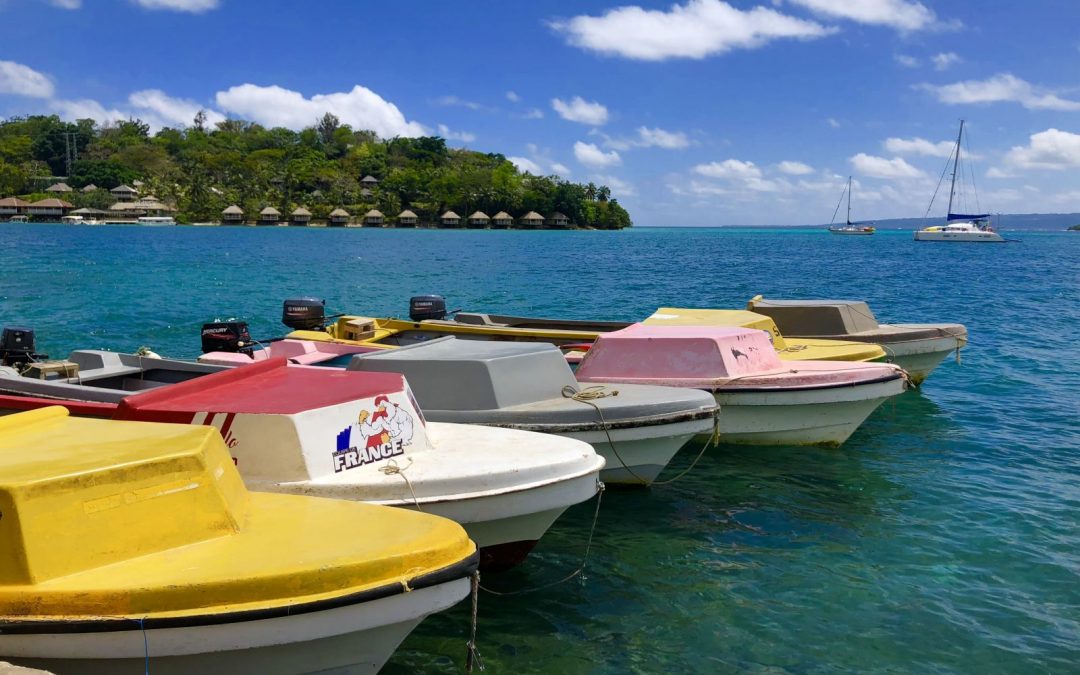“How do we act together to mitigate the impact of human waste on the health of communities” Stephanie Hamel is WASH Program Manager in Vanuatu with EWB Australia and EWB New Zealand. This World Toilet Day she shares her reflections on saniation and the global environmental crisis.
For the past three years, I have worked as a Water Sensitive Urban Design/Drainage Officer in an Australian local council. The main question that I was spending my time thinking of was: ‘how do we design together our built infrastructure to mitigate the impact of connecting our paved areas to our creeks, sending too much rainfall (and its pollution) too fast, and losing the benefit of a precious stormwater resource?’
Freshly arrived in Vanuatu to work with Engineers Without Border, partly with the Department of Public Health and the non-governmental organisation Live and Learn, my focus is now turning to another environmental and health challenge: sanitation. In other words, the new question for my next two years is now: ‘how do we act together to mitigate the impact of human waste on the health of communities and, as the World Toilet Day 2018’s website states, to stop ‘turning our environment into an open sewer’ losing its biodiversity benefits?’
Hint: there are some common themes… Contamination of natural resources from human activities, a combination of technical solutions – including nature-based solutions and behaviour change activities from individual households’ level to central government levels, but also the need to keep a real open mind and look for synergies between sectors to find long-term and inclusive solutions to these complex global issues.
It is fair to say that nobody knows what the answer to the 2.4 billion people with no access to basic sanitation and the 500,000 children under five who die every year from a diarrhoeal disease related to it. So, for today’s World Sanitation Day, here are some aspirations that I think may be worth continuing exploring:
1) Investigate further appropriate ways of separating human waste from our water and soil resources for healthier living for all, including the use of nature-based solutions. Nature might be the answer to nature calls, as this year’s topic suggests, from composting toilets transforming waste into a resource; to wetlands or reeds systems as effective natural treatment systems
2) Uncover what multiple benefits may be achieved for communities if we are to do this in a more integrated way. Improved water quality might be a direct benefit; increased food security might result from the use of compost from human waste or economic benefit might be gained from using a sanitation marketing approach.
3) At the sector level, this means the need to look out for synergies between the sanitation/waste management, water resource management and energy sectors for improved health and livelihood.
To finish with a note from the ground, last week, a colleague from Live and Learn took me to the site of one of the Community-Based Sanitation Enterprise (CBSE) that they have supported for a couple of years and showed me the great work done from technical and management trainings to technical advice and demonstrations sites. In particular, I appreciated the range of technologies offered to the community, covering a wide spectrum of the sanitation ladder: from bush or squatting toilet to full flush ones but also composting toilet which was built for the nearby school. More recently, this approach seems to have gained momentum with Government agencies and other NGOs starting to use the CBSE’s services ranging from supply of sanitation material to technical advice.
Sanitation marketing may be one of the entry points to share knowledge about hygienic practices, increase the supply chain for sanitary products but also understand in depth what barriers and opportunities there are for changing behaviours. In a recent article, the Bill and Melinda Gates Foundation was heavily promoting initiatives in the private sector to come up with what was coined ‘the reinvented toilet’. In Vanuatu, sanitation marketing is also included as a pillar of the final draft of the Sanitation and Hygiene Policy, so it will be interesting to monitor the ramifications on the ground.
On Monday, I will be seeing in action the work of one of the CBSE promoting a range of toilets and continuing the conversation around what technical solution such as nature-based solutions and/or economic drivers such as sanitation marketing may contribute to alleviate this global sanitation issue. And you?


